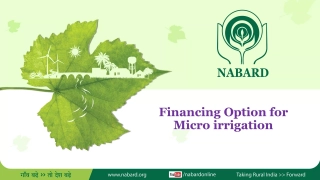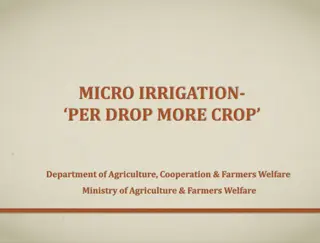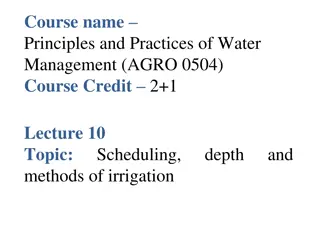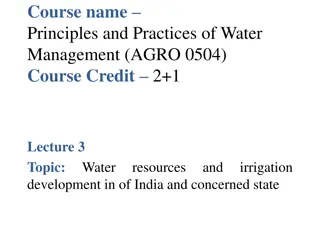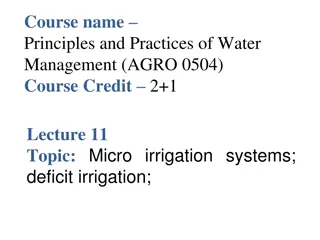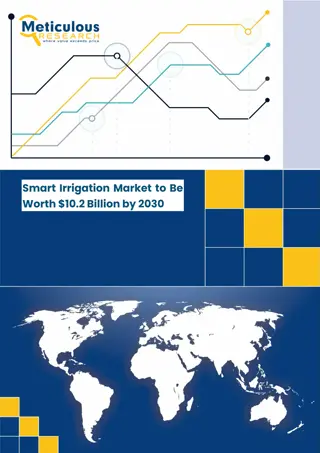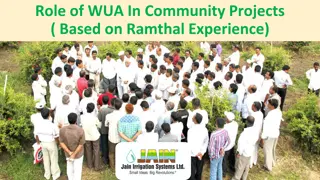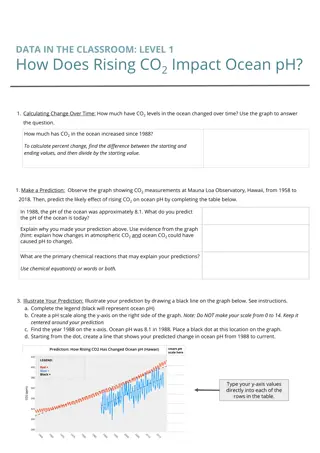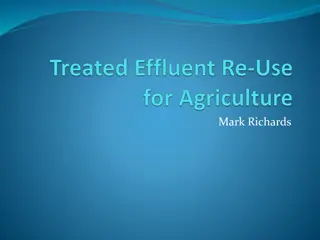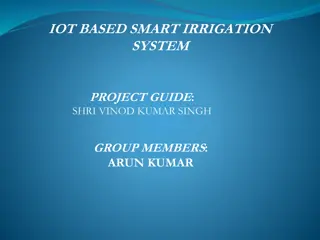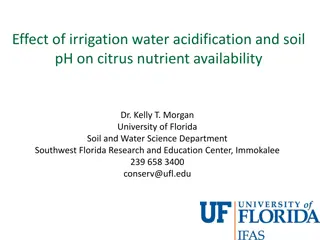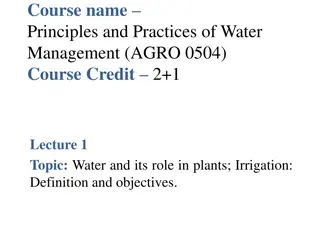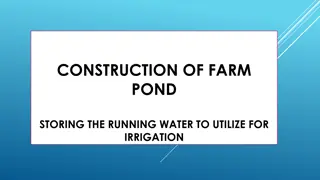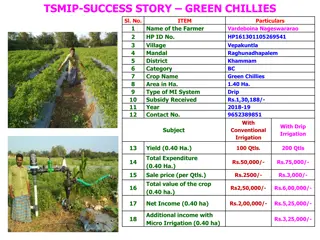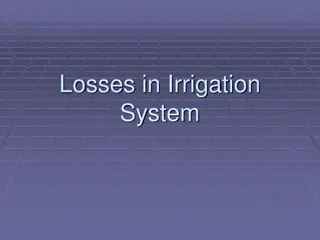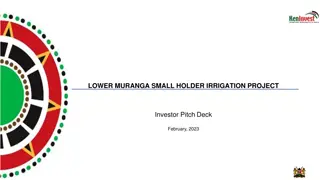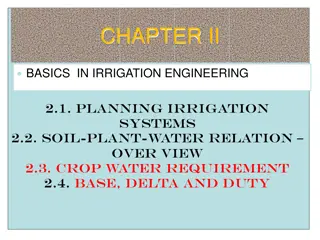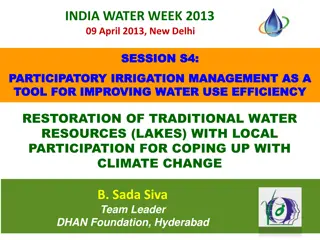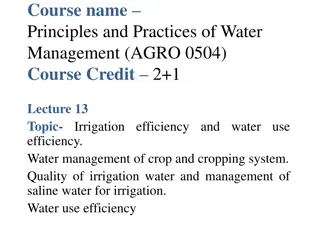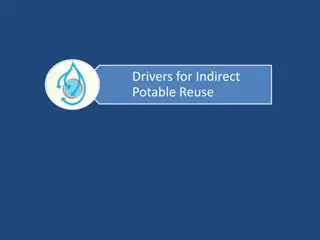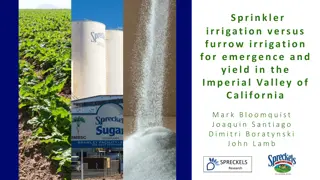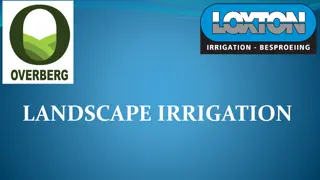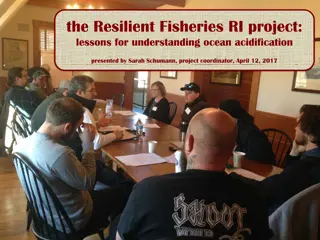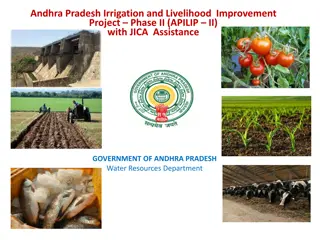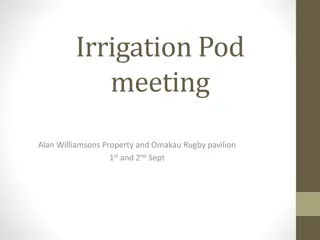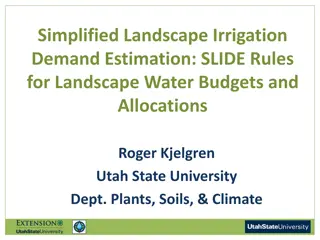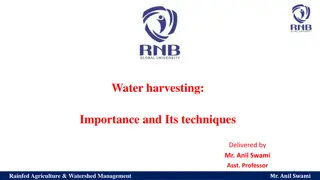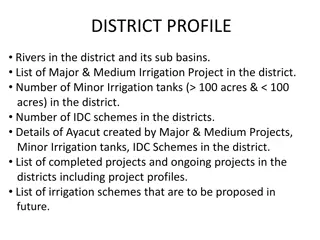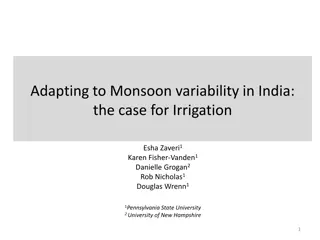Financing Option for Micro irrigation
Explore the financing options available for micro irrigation in India, including loans, subsidies, and funds provided by the government and financial institutions. Learn about the potential areas for micro irrigation and the progress made so far.
1 views • 10 slides
Tradeoffs Between Water Savings and GHG Emissions in Irrigated Agriculture
This study examines the tradeoffs between water savings, economic impact, and greenhouse gas emissions resulting from technological changes in the irrigation industry. Key objectives include estimating water savings for different crops, quantifying GHG emissions from new irrigation technologies, and
1 views • 24 slides
Primer on Major, Medium, and Minor Irrigation Projects in India
Explore the classification and methods of major, medium, and minor irrigation projects in India, including direct and indirect irrigation methods, gravity flow schemes, and lift irrigation systems.
1 views • 28 slides
Micro Irrigation for Increased Crop Yield and Water Efficiency: Insights and Best Practices
Explore the impact of micro irrigation in agriculture, highlighting the Department of Agriculture's efforts to promote water-efficient farming practices. Discover patterns of micro irrigation adoption, successful state initiatives, and the benefits of drip irrigation in terms of cost, yield, and wat
0 views • 10 slides
Micro Irrigation Progress and Growth in Rajasthan
The Department of Horticulture in Rajasthan is making significant strides in micro irrigation, aiming to cover a vast potential area. With a focus on improving irrigation efficiency and expanding coverage, the state shows promising growth trends in the adoption of micro irrigation systems. The progr
1 views • 18 slides
Understanding Irrigation Scheduling for Optimal Crop Yield
Scientific irrigation scheduling plays a vital role in determining the correct timing and quantity of water application for crops to enhance yields efficiently while preserving soil quality. Various criteria are utilized in irrigation scheduling, such as potential evapotranspiration (PET) estimation
13 views • 58 slides
Principles and Practices of Water Management in India: Irrigation Projects and Methods
This course delves into the principles and practices of water management in India, focusing on water resources, irrigation sources, major, minor, and medium irrigation projects, and various irrigation methods adopted in the country. It covers the classification of irrigation projects based on covera
7 views • 7 slides
Principles and Practices of Micro Irrigation Systems
Explore the world of drip irrigation, a precise and efficient method of watering crops. Originating in Israel in 1964, drip irrigation is widely adopted in regions with water scarcity and salt issues. This system enables controlled water application to a variety of crops, increasing yield and conser
4 views • 23 slides
Principles and Practices of Water Management: Fertigation in Controlled Environments
Fertigation is a cultivation method where complete fertilizer is delivered to crops in solution form through drip irrigation. Basic requirements include greenhouses, drip irrigation systems, clean water supply, pH and EC adjustment tools, and suitable nutrient concentrations. Effective water managem
4 views • 10 slides
Smart Irrigation Market - Global Opportunity Analysis And Industry Forecast (202
Smart Irrigation Market by Type (Weather Based, Soil Moisture Based) Component (Monitoring, Controlling, Connectivity, Software), Irrigation Type (Sprinkler, Drip, Surface, Pivot), End Use, and Geography - Global Forecast to 2030\n
4 views • 4 slides
Enhancing Community Projects Through Water User Associations (WUA) in Ramthal Experience
The role of Water User Associations (WUAs) in community projects, such as irrigation schemes, plays a vital role in improving service delivery, ensuring reliable water supply, reducing losses, and enhancing productivity. By implementing Public-Private Partnerships (PPP) in irrigation, better results
0 views • 13 slides
Understanding Ocean pH Changes Due to Rising CO2 Levels
Explore the impact of rising CO2 levels on ocean pH through data analysis, predictions, and comparisons. Learn how to calculate changes over time, predict pH levels, and understand the processes influencing ocean acidification at different locations. Dive into levels ranging from measuring changes i
1 views • 6 slides
Understanding Ocean Acidification: Impact on Coral Reefs
Ocean acidification is the process where oceans become more acidic due to excessive carbon dioxide absorption. Human activities like deforestation and vehicle emissions contribute to this phenomenon. Coral reefs are crucial as many ocean species rely on them for survival. The pH scale measures acidi
0 views • 18 slides
Comprehensive Guide to Irrigation in Agriculture
Irrigation plays a crucial role in agriculture, enhancing crop quality, increasing yields, and driving global food production. This guide covers the benefits, needs, and water quality-related problems associated with irrigation in agriculture, emphasizing its importance in sustaining food supply and
5 views • 14 slides
IoT Based Smart Irrigation System Project Guide
Monsoon-dependent Indian agriculture can benefit from an automatic irrigation system that prevents both over- and under-irrigation. By leveraging wireless technology, such as sensors for soil moisture, air humidity, temperature, and water levels, this project aims to optimize crop production by savi
4 views • 14 slides
Understanding Citrus Nutrient Availability in Relation to Soil pH and Irrigation Water Acidification
This research by Dr. Kelly T. Morgan from the University of Florida explores the impact of soil pH, irrigation water acidification, and nutrient recommendations on citrus trees affected by HLB disease. The study examines the availability of key nutrients such as Mn and Zn, the effects of different s
0 views • 23 slides
Challenges and Importance of Water Management in Agriculture
Sustainable water management is a crucial challenge globally due to population growth, urbanization, and industrialization. Irrigation plays a vital role in agriculture, aiding in increased production and efficient resource utilization. However, improper irrigation practices can lead to water wastag
2 views • 11 slides
Constructing Farm Ponds for Water Harvesting and Irrigation in Rural Areas
Proper water harvesting is essential for agricultural sustainability in rural areas. Farm ponds serve as reservoirs to store runoff and running water from natural sources, aiding in irrigation and fish production. The construction of a farm pond in Gram Panchayat Dulmot has significantly benefitted
0 views • 5 slides
Micro Irrigation Success Stories: Green Chillies, Chrysanthemum, Marigold, Cabbage
Discover the success stories of farmers implementing micro irrigation systems in cultivating green chillies, chrysanthemum, marigold, and cabbage. These stories showcase increased yields, improved profits, and enhanced sustainability through the adoption of drip irrigation systems.
0 views • 8 slides
Understanding Losses in Irrigation Systems: Measurement Methods and Techniques
Losses in irrigation systems, including seepage and evaporation, are major concerns impacting water conservation. This article discusses historical estimates of losses, types of losses (seepage and evaporation), methods used to measure losses (direct and indirect), and detailed information on seepag
6 views • 29 slides
The Global Water Crisis and Transboundary Issues in Southern Africa
The global water crisis is a pressing issue affecting millions worldwide, with about 700 million people currently living below the water-stress threshold. By 2025, this number is projected to reach 3 billion. The increasing pressure on shared water resources in countries like Botswana, Namibia, and
1 views • 52 slides
Planning of Surface Irrigation Systems in Agricultural Structures: A Comprehensive Guide
Planning and implementing surface irrigation systems, such as basin irrigation and furrow irrigation, play a crucial role in optimizing water distribution for agricultural purposes. This article delves into the detailed planning considerations for basin irrigation systems, including sizing of basins
1 views • 10 slides
Lower Muranga Small Holder Irrigation Project Investor Pitch Deck
Agricultural sector crucial for Kenya's economy. Proposed irrigation project aims to boost farm output, food security, and economic growth. Seeking investors for $102.5 Mn investment in irrigation and hydropower infrastructure across Muranga catchment area. Projected positive NPV and IRR, benefiting
0 views • 12 slides
Stakeholder Engagement in New Jersey Ocean Acidification Mitigation and Adaptation Planning
This content discusses stakeholder engagement in New Jersey's efforts to mitigate and adapt to ocean acidification, focusing on the economic, social, and environmental impacts on coastal communities. The process, methods, goals, and key takeaways of stakeholder engagement are outlined, emphasizing t
1 views • 12 slides
Basics of Crop Water Requirements in Irrigation Engineering
Understanding crop water requirements is crucial in planning effective irrigation systems. Crop water requirements are determined by factors such as evapotranspiration, soil conditions, and achieving maximum production potential. Effective rainfall, soil moisture storage, and groundwater contributio
0 views • 83 slides
Participatory Irrigation Management for Improved Water Use Efficiency and Climate Change Adaptation
DHAN Foundation in Hyderabad is implementing participatory irrigation management for enhancing water use efficiency and restoring traditional water resources like lakes with local participation. The focus is on conservation and development of traditional irrigation tanks to promote livelihoods, maxi
0 views • 11 slides
Wireless Soil Moisture Tension Measurements for Irrigation Management
High-density, multiple-depth wireless soil moisture tension measurements were conducted in a vineyard in Napa Valley. The study found correlations between soil moisture tensions and leaf water potential, offering valuable insights for irrigation management. Utilizing a wireless sensor network, the s
0 views • 16 slides
Principles and Practices of Water Management in Agricultural Cropping Systems
This course delves into the principles and practices of water management in agricultural cropping systems, focusing on topics such as irrigation efficiency, water use efficiency, crop and cropping system water management, and quality of irrigation water. It explores how assured irrigation water faci
0 views • 16 slides
Optimizing Surface Irrigation Systems for Farm Production
In the field of ZRAAT FAKLTES, the planning and implementation of surface irrigation systems play a crucial role in enhancing farm production and profitability. Various simulation programs like TYS-624 are utilized for optimizing surface irrigation methods. Assumptions regarding crop root system, in
0 views • 8 slides
Strategies for Sustainable Water Management
Drivers for indirect potable reuse include water stress, population growth, industrial development, droughts, and climate change. Other drivers for water reuse encompass conservation, environmental enhancement, pollution abatement, and regulatory policies. Rising water rates and costs of imported wa
0 views • 21 slides
Comparative Study of Sprinkler Irrigation vs. Furrow Irrigation for Sugar Beet Production in Imperial Valley, California
This research project in the Imperial Valley, California, compares the effectiveness of sprinkler irrigation and furrow irrigation on sugar beet emergence and yield during the production season. Through field surveys and data analysis, the study aims to determine the impact of irrigation methods on
0 views • 25 slides
Efficient Landscape Irrigation Tips
Proper irrigation is essential for plant survival and growth. Understanding water requirements, designing efficient systems, choosing the right products like drip or sprinklers, and utilizing water-saving techniques are key to maintaining a healthy landscape while conserving water resources.
0 views • 12 slides
Understanding Water Quality Variables and Their Impact on Ecosystems
Water quality variables play a crucial role in natural ecological systems and human water use. Factors like mineral concentrations, toxins, and disease organisms affect the suitability of water for various purposes such as drinking, livestock, irrigation, and industrial use. Density and temperature
0 views • 18 slides
The Resilient Fisheries RI Project: Insights on Ocean Acidification by Sarah Schumann
The Resilient Fisheries RI Project, led by project coordinator Sarah Schumann, aims to understand ocean acidification's impact on Rhode Island's fishing industry. Through participatory action research and social learning, the project explores climate change and adaptive capacity within the commercia
0 views • 26 slides
Andhra Pradesh Irrigation and Livelihood Improvement Project Phase II Overview
Andhra Pradesh Irrigation and Livelihood Improvement Project Phase II (APILIP-II) is a project with JICA assistance aimed at increasing irrigated area, local productivity, and livelihoods of farmers in Andhra Pradesh. The project involves modernizing irrigation projects, promoting integrated farming
0 views • 23 slides
Success Story of Farming Development Through Irrigation
Journey of a farmer from Paerau to becoming a successful agriculture entrepreneur by utilizing irrigation to transform the family farm into a thriving business. The implementation of irrigation enabled the farm to diversify its operations, increase production, and ensure sustainability for future ge
0 views • 21 slides
Simplified Landscape Irrigation Demand Estimation: SLIDE Rules for Water Budgets
Simplified Landscape Irrigation Demand Estimation presents a comprehensive guide on managing urban landscape water use efficiently. Collaborators from various institutions contribute to addressing the challenges posed by drought and climate change. The document explores plant water demand, atmospher
0 views • 29 slides
Water Harvesting Techniques in Rainfed Agriculture & Watershed Management
Water harvesting plays a crucial role in rainfed agriculture by collecting and storing runoff water for irrigation in arid and semi-arid regions. Mr. Anil Swami, an assistant professor, discusses the importance of water harvesting techniques, including runoff farming and rainwater harvesting. He emp
0 views • 13 slides
Comprehensive Irrigation District Profile and Plans
This detailed document covers the district's rivers, irrigation projects, completed and ongoing projects, future proposals, and expectations from field staff. It also outlines the irrigation plan, project profiles, nodal officer details, and proformas for data submission. The emphasis is on validati
0 views • 7 slides
Adapting to Monsoon Variability in India: The Case for Irrigation
This study explores the impact of monsoon variability on crop irrigation in India using an empirical model. It examines changes in crop irrigated areas in response to monsoon variations, focusing on rice, wheat, and sorghum. The research analyzes crop water needs, sensitivity to drought, and irrigat
0 views • 11 slides
